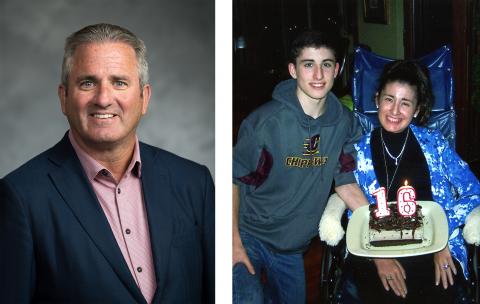By Haley Otman, Michigan Medicine Communications
Scott Pranger, whose wife had amyotrophic lateral sclerosis (ALS), knows there’s a lesser-known part of the disease that wreaks havoc on families for years after their loved one passes, causing daily stress to intertwine with their grief.
Beyond the heart wrenching symptoms and the physically exhausting requirements of caring for someone with a disease that keeps getting worse until it becomes fatal, no one should have to worry about cash flow, especially not if you already have health insurance.

That’s what Pranger thought.
And luckily for his family, he’d been successful in business thus far.
His family was doing just fine financially, so he didn’t expect his wife’s new doctor (Dr. Eva Feldman) to suggest that, instead of staying home with her and their toddler after her devastating diagnosis, he should keep going to work and keep nourishing that entrepreneurial spirit he’d had simmering on the back burner.
“When Scott heard that many families with slowly progressing ALS end up filing for bankruptcy, he knew what he had to do,” says his longtime employee and friend Kim Parsons.
Pranger took a leap of faith and left a 20-year corporate vice president job to start his own company in 2004, EQI LTD. He knew that even as a corporate executive, providing for his son and family was going to be a major challenge financially.
SEE ALSO: Pranger Endows ALS Clinic with $2 Million Gift
Over the next 12 years, their neurologist’s advice started to make sense. At first it was a wheelchair for his once adventurous, ready-for-anything but always-dressed-for-the-occasion wife Cathleen. Then, it was at-home caregivers to provide some extra help. Eventually, Cathleen needed 24-hour care, and a house that would be better suited to accommodate her ever changing needs.
As ALS progresses, patients like Cathleen slowly lose their nerve function until it becomes impossible to move, speak or breathe.
“(Michigan Medicine’s) Dr. Eva Feldman was right that providing excellent care for Cathleen would require a small fortune,” Pranger says. “Thankfully, God blessed my business with exceptional employees and customers, but I often wondered how other families handled the financial stress of living with ALS.”
Pranger decided, in memory of Cathleen, who died in 2015, he wanted to partner with the Michigan Medicine experts they’d become so familiar with to ease the financial burden for other families.
He gave a gift to the now-Pranger ALS Clinic to ensure it can continue to offer essential services like physical and occupational therapy, nutrition, and social work support at no cost to patients.
As the disease progresses, it’s hard to imagine what kind of help you’ll require, but even this fiercely independent couple soon found out there’s really no limit. Over the course of Cathleen’s 15-year battle with ALS, Pranger says the cost of care exceeded $2 million that wasn’t covered by their insurance company.
